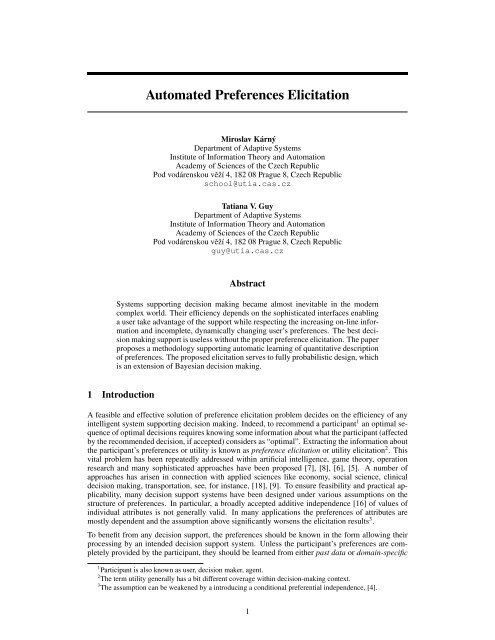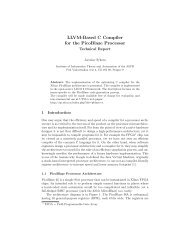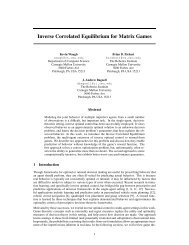decision making with multiple imperfect decision makers - Institute of ...
decision making with multiple imperfect decision makers - Institute of ...
decision making with multiple imperfect decision makers - Institute of ...
Create successful ePaper yourself
Turn your PDF publications into a flip-book with our unique Google optimized e-Paper software.
Automated Preferences ElicitationMiroslav KárnýDepartment <strong>of</strong> Adaptive Systems<strong>Institute</strong> <strong>of</strong> Information Theory and AutomationAcademy <strong>of</strong> Sciences <strong>of</strong> the Czech RepublicPod vodárenskou věží 4, 182 08 Prague 8, Czech Republicschool@utia.cas.czTatiana V. GuyDepartment <strong>of</strong> Adaptive Systems<strong>Institute</strong> <strong>of</strong> Information Theory and AutomationAcademy <strong>of</strong> Sciences <strong>of</strong> the Czech RepublicPod vodárenskou věží 4, 182 08 Prague 8, Czech Republicguy@utia.cas.czAbstractSystems supporting <strong>decision</strong> <strong>making</strong> became almost inevitable in the moderncomplex world. Their efficiency depends on the sophisticated interfaces enablinga user take advantage <strong>of</strong> the support while respecting the increasing on-line informationand incomplete, dynamically changing user’s preferences. The best <strong>decision</strong><strong>making</strong> support is useless <strong>with</strong>out the proper preference elicitation. The paperproposes a methodology supporting automatic learning <strong>of</strong> quantitative description<strong>of</strong> preferences. The proposed elicitation serves to fully probabilistic design, whichis an extension <strong>of</strong> Bayesian <strong>decision</strong> <strong>making</strong>.1 IntroductionA feasible and effective solution <strong>of</strong> preference elicitation problem decides on the efficiency <strong>of</strong> anyintelligent system supporting <strong>decision</strong> <strong>making</strong>. Indeed, to recommend a participant 1 an optimal sequence<strong>of</strong> optimal <strong>decision</strong>s requires knowing some information about what the participant (affectedby the recommended <strong>decision</strong>, if accepted) considers as “optimal”. Extracting the information aboutthe participant’s preferences or utility is known as preference elicitation or utility elicitation 2 . Thisvital problem has been repeatedly addressed <strong>with</strong>in artificial intelligence, game theory, operationresearch and many sophisticated approaches have been proposed [7], [8], [6], [5]. A number <strong>of</strong>approaches has arisen in connection <strong>with</strong> applied sciences like economy, social science, clinical<strong>decision</strong> <strong>making</strong>, transportation, see, for instance, [18], [9]. To ensure feasibility and practical applicability,many <strong>decision</strong> support systems have been designed under various assumptions on thestructure <strong>of</strong> preferences. In particular, a broadly accepted additive independence [16] <strong>of</strong> values <strong>of</strong>individual attributes is not generally valid. In many applications the preferences <strong>of</strong> attributes aremostly dependent and the assumption above significantly worsens the elicitation results 3 .To benefit from any <strong>decision</strong> support, the preferences should be known in the form allowing theirprocessing by an intended <strong>decision</strong> support system. Unless the participant’s preferences are completelyprovided by the participant, they should be learned from either past data or domain-specific1 Participant is also known as user, <strong>decision</strong> maker, agent.2 The term utility generally has a bit different coverage <strong>with</strong>in <strong>decision</strong>-<strong>making</strong> context.3 The assumption can be weakened by a introducing a conditional preferential independence, [4].1







